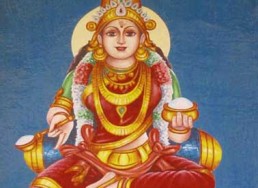Brahmarpanam Brahma Havih
ब्रह्मैव तेन गंतव्यं ब्रह्मकर्म समाधिना ।।
brahmaiva tena gaṃtavyaṃ brahmakarma samādhinā ..
ब्रह्मार्पणम् (brahmārpaṇaṃ) – the offering is Brahman; ब्रह्म हविः (brahma haviḥ) – the oblation is Brahman; ब्रह्माग्नौ (brahmāgnau) – into the fire of Brahman; ब्रह्मण (brahmaṇa) – by Brahman; हुतम् (hutam) – it is offered; ब्रह्मैव (brahmaiva) – Brahman alone; तेन (tena) – by that; गन्तव्यं (gaṃtavyaṃ) – is to be attained; ब्रह्मकर्म (brahmakarma) – action pertaining to Brahman; समाधिना (samādhinā) – by the one who is absorbed.

Description
Invocation before food. We should partake food with a sathvic (pure, serene) mind. Our ancestors recommended the offering of food to God before partaking. Food so partaken becomes prasad (consecrated offering). Prayer cleanses the food of the three impurities caused by the absence of cleanliness of the vessel, cleanliness of the food stuff, and cleanliness in the process of cooking. It is necessary to get rid of these three impurities to purify the food, for pure food goes into the making of a pure mind. It is not possible to ensure the purity of the cooking process because we do not know what thoughts rage in the mind of the man who prepares the food. Similarly, we cannot ensure the cleanliness of the food ingredients because we do not know whether it was acquired in a righteous way by the person who sold it to us. Hence, it is essential on our part to offer food to God in the form of prayer so that these three impurities do not afflict our mind.This verse from the Bhagavad Gita (Chapter 4, verse 24) and is traditionally chanted before meals. Brahman is the name of the Lord, the cause of the whole creation. Looking at the whole creation as an effect, Brahman is seen as the cause of everything. The effect does not exist separate from its cause. This verse likens food that is eaten to an oblation poured into the fire during ritual. By chanting this prayer before meals, the food that is eaten is offered to Brahman, the Lord.
Other Annapurna Shlokams
Aham Vaishvanaro Bhutva
Becoming the fire of life, I enter into the bodies of all creatures and mingling with the upward and downward breath I digest the four kinds of food (masticated, drunk, licked, sucked).
Annabrahma Rasovishnu
Deem food as Brahma, drinks as Vishnu and the consumer as Lord Maheswara, with this attitude there will be, no evil-intentioned looks.
Annapurna Stotram
Annapurna is the goddess of food and nourishment. She is a form of Parvati, the inseparable shakti of Lord Shiva. Anna is translated as "food" and "grains" and purna means "full" or "complete". Annapu
Annapurne Sadapurne
Salutations to Mother Annapoorna: O Mother Annapoorna, You who are always full (with the gift of Food and Blessings), You who are the beloved of Shankara (Shiva), O Mother Parvati, Please grant me the
Brahmarpanam Brahma Havih – Annapurna – In Sanskrit with English Transliteration, Translation and Meaning. Commentary for selected Shlokams.

